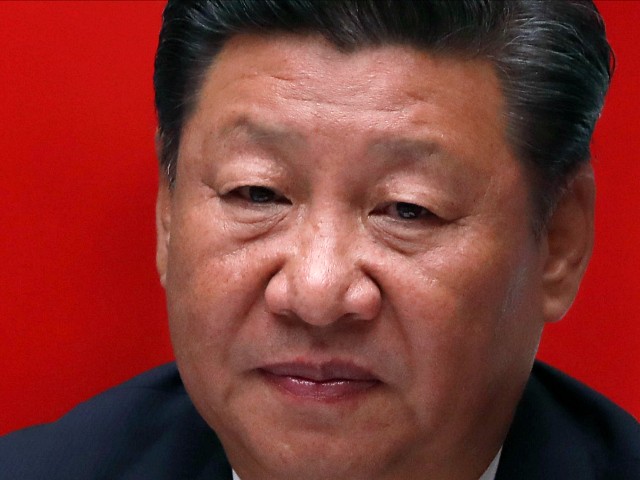Xi Jinping Admits: 'Global Consensus' Turning Against Globalism

Chinese dictator Xi Jinping admitted “great concern” in a speech on Thursday that popular sentiment around the world is turning against “economic globalism,” particularly in light of China’s use of its economic dominance to coerce foreign companies to adhere to communist ideology. China observed 20 years as a member of the World Trade Organization this week, an era marked by Chinese manufacturing dominance and extreme working class devastation in the United States. China’s stranglehold on manufacturing has resulted in dozens of multinational companies becoming implicated in the enslavement of millions of members of Muslims-majority Chinese ethnic groups, one of several atrocities committed against these groups that the U.S. government has declared a genocide. Xi was speaking on Thursday at the China International Import Expo (CIIE), an event meant to foster reliance on Chinese trade in vulnerable nations. While Xi took some time to boast of China’s astronomical economic successes in the aftermath of the Chinese coronavirus pandemic – which gave the Communist Party an opportunity to flood the world with low-quality personal protective equipment (PPE) – he dedicated much of his remarks to the fact that many countries and their citizens were reconsidering the globalization of the economy as an unquestioned good. A resident undergoes a nucleic acid test for the coronavirus in Xian in China’s northern Shaanxi province on October 20, 2021 (STR/AFP via Getty Images). “Unilateralism and protectionism are on the rise, and economic globalization is facing headwinds,” Xi lamented. “Studies show a steady decline of the World Openness Index over the past decade and a weakening of global consensus on opening up, which are causes for great concern.” “We must stay on top of the prevailing trend of economic globalization, and support countries around the world in opening up wider while rejecting unilateralism and protectionism,” he demanded. “This is significantly important if we are to take humanity to a better future.” Xi called the China-dominated World Trade Organization the “cornerstone of international trade” and admitted that support for the group “faces challenges.” The WTO classifies China, the second-largest economy in the world, as a “developing” country, which grants it special privileges to make it more competitive with the other economies of its size. As such, the WTO is indispensable to Chinese economic dominance. WFABRICE COFFRINI/AFP/Getty Images The Chinese dictator did not fail to celerate China’s success thanks to those privileges, particularly in light of the collapse of many world economies in light of the Chinese coronavirus pandemic. Unlike many developed countries, which forced businesses to shut down, China increased production capacity and flooded the locked down economies with Chinese products. “Since the start of [the Chinese coronavirus pandemic], China has provided to the international community some 350 billion masks, over four billion protective suits, over six billion testing kits, and over 1.6 billion doses of vaccines,” Xi boasted. Xi also listed more specific achievements: Over the last 20 years, China’s economic size has grown from the 6th to the 2nd largest in the world, trade in goods from the 6th to the 1st, and trade in services from the 11th to the 2nd. China has led developing countries in utilized foreign investment, and its outbound direct investment (ODI) has risen from the 26th to the 1st.
The past 20 years have witnessed a China deepening reform and pursuing all-round opening up, a China seizing opportunities and rising to challenges, and a China stepping up to its responsibilities and benefiting the whole world. “As the only major economy to register positive growth of trade in goods last year, China has made important contributions to keeping global industrial and supply chains stable and boosting world economic recovery,” Xi asserted.
The Chinese coronavirus pandemic began in Wuhan, China, in late 2019. A year later, China documented a record $75.4 billion trade surplus and a 21.1-percent increase in exports year-on-year. In the same time period, China documented a 46-percent increase in exports to the United States. While reminding the world of China’s economic successes at the expense of many other economies, Xi’s concern for the future of globalization as a viable economic path differed significantly from his remarks at the first-ever CIIE, in which he declared that the move towards globalization was “irreversible.” “People with vision in the world would agree that economic globalization, as an irreversible trend of history, has greatly boosted global growth,” Xi said in 2018, adding: This is an overarching trend, something that is independent of people’s will. What we mankind can do is to understand, adapt to, and apply the law of history instead of trying to prevent it from happening.
The wheel of history, indeed, will keep rolling forward no matter what. In the aftermath of four years of policies in the White House largely intended to contain China’s economic influence, Xi began to limit his references to globalization as “irreversible” or inevitable, instead asserting that opposition to globalization constituted isolationism and intimidation. “To build small circles or start a new Cold War, to reject, threaten or intimidate others, to willfully impose decoupling, supply disruption or sanctions, and to create isolation or estrangement will only push the world into division and even confrontation,” Xi told the World Economic Forum in Davos, Switzerland, this January. “We cannot tackle common challenges in a divided world, and confrontation will lead us to a dead end.” Follow Frances Martel on Facebook and Twitter.
Read the full article at the original website
References:
- https://www.breitbart.com/national-security/2019/08/12/china-strongarms-coach-versace-givenchy-apologizing-t-shirts/
- https://www.breitbart.com/economy/2021/11/04/china-marks-20-years-in-world-trade-organization/
- https://www.breitbart.com/asia/2020/03/02/study-nike-apple-bmw-among-83-brands-using-chinese-muslim-slave-labor/
- https://www.breitbart.com/asia/2020/09/28/international-clothing-brands-scramble-leave-chinas-xinjiang/
- http://en.people.cn/n3/2021/1105/c90000-9915785.html
- https://media.breitbart.com/media/2021/10/October-20.jpeg
- https://www.breitbart.com/economy/2020/12/07/china-trade-surplus-sets-record-high-as-world-reels-from-pandemic/
- https://www.breitbart.com/asia/2018/11/05/xi-jinping-globalization-happen-independent-peoples-will/
- https://www.breitbart.com/national-security/2021/01/25/chinas-xi-jinping-scolds-us-avoid-cold-war-arrogant-isolation-davos/
